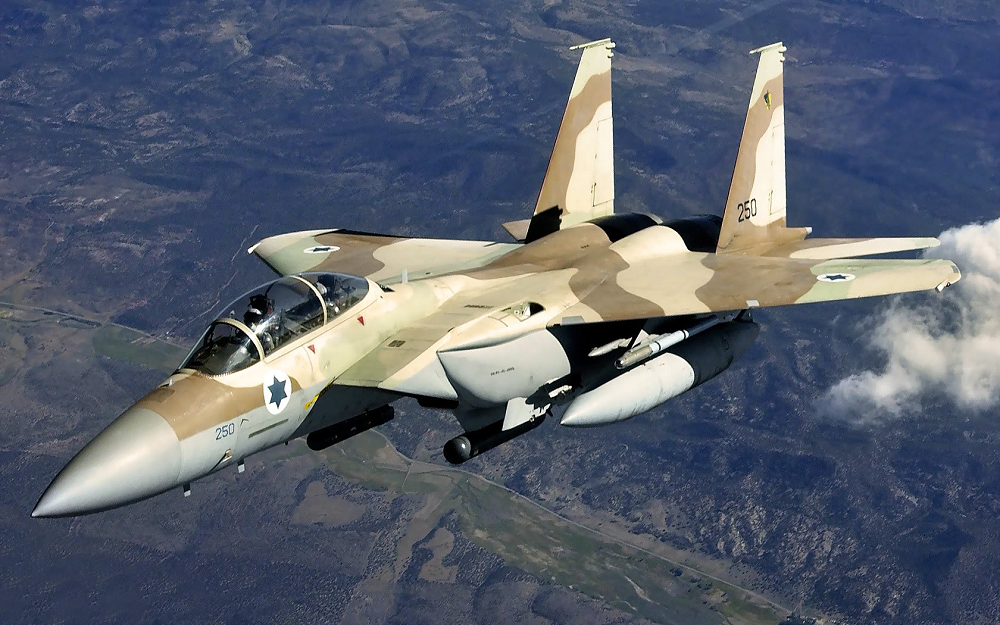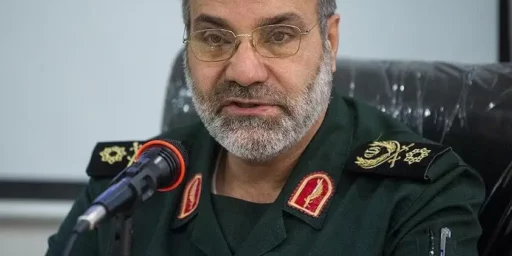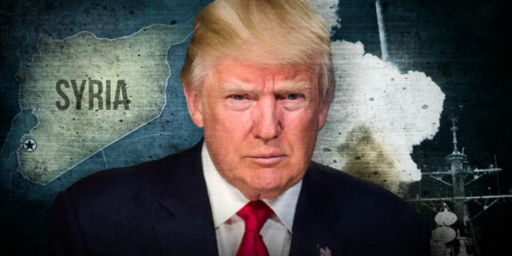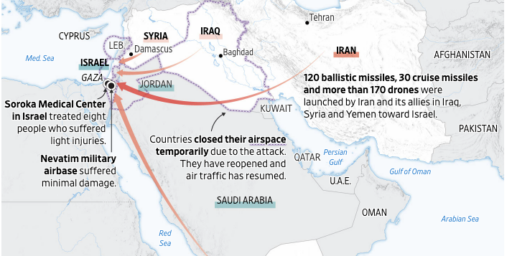Someone Retaliated Against Syria for Latest Chemical Attack
A response to one of the most deadly chemical attacks in the Syrian civil war has come, probably from Israel. What's next?
 President Trump has been signaling an intention to withdraw from the conflict in Syria, now that the Islamic State’s “caliphate” there is largely defeated. A particularly gruesome chemical attack by the Assad regime yesterday appears to have sparked a course reversal.
President Trump has been signaling an intention to withdraw from the conflict in Syria, now that the Islamic State’s “caliphate” there is largely defeated. A particularly gruesome chemical attack by the Assad regime yesterday appears to have sparked a course reversal.
NYT (“As Trump Seeks Way Out of Syria, New Attack Pulls Him Back In“):
Days after President Trump said he wanted to pull the United States out of Syria, Syrian forces hit a suburb of Damascus with bombs that rescue workers said unleashed toxic gas.
Within hours, images of dead families sprawled in their homes threatened to change Mr. Trump’s calculus on Syria, possibly drawing him deeper into an intractable Middle Eastern war that he hoped to leave.
“Many dead, including women and children, in mindless CHEMICAL attack in Syria,” Mr. Trump wrote on Twitter on Sunday. He blamed Iran and Russia — even singling out President Vladimir V. Putin of Russia by name — for their support of the Syrian government.
“Big price to pay,” he wrote, without providing details.
His homeland security adviser, Thomas P. Bossert, said the White House national security team had been discussing possible responses and would not rule out a missile strike.
The reported chemical attack on Douma, a suburb of the capital, Damascus, on Saturday seems to have squeezed Mr. Trump between conflicting impulses, and raised the political and military stakes as he charts the United States’ future in Syria.
On one hand, he has emphatically expressed his desire to bring American troops home as soon as possible in line with his “America First” approach. On the other, he has vowed to punish some bad actors, and withdrawing from Syria could open him up to criticism at home and abroad.
“The withdrawal of U.S. troops from Syria now would have major negative repercussions for the region and beyond,” said Murhaf Jouejati, a Syrian-American professor of international relations at the Emirates Diplomatic Academy in Abu Dhabi, United Arab Emirates.
While chemical weapons use has been routine in this conflict, these were among the worst.
NYT (“Dozens Suffocate in Syria as Government Is Accused of Chemical Attack“):
Dozens of Syrians choked to death after a suspected chemical attack struck the rebel-held suburb of Douma, east of Damascus, with aid groups on Sunday blaming President Bashar al-Assad’s government for the assault and Western governments expressing outrage.
Rescue workers in Syria reported finding at least 42 people dead in their homes from apparent suffocation, and antigovernment activists circulated videos of lifeless men, women and children sprawled out on floors and in stairwells, many with white foam coming from their mouths and nostrils.
A stream of patients with burning eyes and breathing problems were rushed to clinics after the attack at dusk on Saturday, medical and rescue groups said.
The attack appeared to break the will of Douma’s rebels, who agreed on Sunday to a deal with the government to hand the area over and be bused to another area outside government control in the country’s north. Thousands of fighters and tens of thousands of their relatives are expected to leave soon.
The latest atrocity in Syria’s agonizing seven-year civil war drew immediate condemnation from the United States and the European Union, but Mr. Assad’s allies in Moscow and Tehran dismissed allegations of a chemical attack as “bogus.”
The British Foreign Office called for an urgent investigation and said that if the use of chemical weapons proved to be true, “it is further proof of Assad’s brutality.”
Someone has reportedly retaliated using American-made fighter jets. While the initial surmise was that it was the United States, the accusations turned to Israel.
WaPo (“Syria says strike on military base carried out by Israeli warplanes“):
A missile strike on an air base in central Syria was carried out by Israeli warplanes in the early hours of Monday morning causing multiple casualties, according to the Syrian and Russian governments, amid fears of renewed regional confrontation.
Israeli officials did not immediately comment on the reports. The raid on the T4 airfield in Homs province comes as tensions rise over possible U.S. military action in Syria in response to a suspected chemical weapons attack on a Damascus suburb late Saturday.
U.S. officials say they were weighing options to strike Syrian government targets and at first Syria’s state news agency blamed the strike on the United States. It later backtracked following Pentagon denials.
“At this time, the Department of Defense is not conducting airstrikes in Syria,” the Pentagon said in a statement.
While the US sometimes issues denials for clandestine activities like drone strikes, I can’t recall a modern example of denying this sort of attack—let alone in a conflict where we’ve already conducted numerous overt actions. And Israel is certainly a plausible suspect here.
A Syrian military source and the Russian Defense Ministry said Israeli F-15 fighter jets carried out Monday’s strike from Lebanese airspace.
According to the Britain-based Syrian Observatory for Human Rights, most of the 14 killed were either Iranian forces or Iran-backed proxies supporting the Syrian government.
Iran is a staunch ally of the Syrian government, and has deployed forces and assets inside Syria, including a network of pro-government fighters it uses as shock troops in battles with Syrian rebels.
Israel has grown increasingly alarmed as Iran and its Lebanese proxy, Hezbollah, extend their military reach and influence in the region, including an expanded presence near Israel’s northern border.
In February, Israel confirmed that it had targeted the same airfield in Homs, after an Iranian drone entered Israeli airspace. Eight warplanes were used in that attack, Israel’s military said, including one F-16 fighter jet that was downed by Syrian antiaircraft fire.
“The timing of the strike isn’t coincidental,” said Michael Horowitz, a senior analyst at Le Beck International, a Middle East-based geopolitical and security consultancy.
“By striking [Syrian President Bashar al-Assad] and his Iranian allies just a day after Trump warned them of the price they would pay … Israel mitigates the risk of an Iranian response,” he said. “Israel has been trying to convince Washington to adopt a more pro-active, anti-Iran strategy in Syria, and certainly sees Trump’s rhetoric in the wake of the chemical attack as an opportunity.”
As always, the question after these strikes is What now? Is there a strategy to disarm Assad or end this bloody conflict? Or is this just a show of force in order to give the illusion of “doing something”?






My guess is that this was an Israeli operation and that it was more connected to ongoing cross-border issues in northern Israel than it was to the recent chemical weapons attack. If the reports this morning are any indication, there aren’t many American assets in the region that could have been used to launch such an attack. We reportedly don’t have significant naval assets in the western Mediterranean at the moment, and it seems unlikely that Turkey would have authorized a strike from one of the NATO bases there.
As for your questions:
¯\_(ツ)_/¯
No, and Assad is likely to remain in power until the Russians and Iranians no longer find him useful.
Yes.
I doubt that a military intervention by Israel in Syria is going to be seen as a simple effort to improve the status of noncombatants. The history of struggles in that region has produced a mindset that is unlikely to make people think that Israel is simply trying to do good and protect the weak. The same is true of the USA. The blue-helmets of the UN are very hard to organize, and their record in Lebanon is not spotless. The gratification of some immediate, direct action is not available. We should accept this. This does not mean silence; we should speak. Withdrawal of American troops is important; we can’t expect restraint by other outsider nations while we have troops there.
As of now, Israel hasn’t confirmed or denied making the strike.
We need to stop losing wars. We really need to stop this now. The reality is we will be forced out of Afghanistan, and we will lose all leverage in Iraq and we have no capacity to change a single damn thing at this point in Syria. Under George W. Bush we made several serious strategic errors, perpetuated by Mr. Obama and now Trump pursuing sunk costs. The result has been a drastic reduction in US power and sway in the middle east.
This is what happens when you lose wars. We’ve now lost Vietnam, Iraq, Afghanistan and Syria. We have adopted such a credulous, quasi-mystical veneration for the US military that we have failed to notice that they really are not good at anything but bombing. The Pentagon loses wars.
Of course it’s the politicians who dispatch the military, but despite occasional warnings from men like Gen. Shinseki, the Pentagon will simply not look a president in the eye and say, “We’re going to lose this thing.” The Pentagon and the American people are co-conspirators in this fantasy of American omnipotence. The only war we’ve actually won since VJ-Day was Iraq 1 and we won that because it was a straight-up slugfest against an absurdly overmatched pipsqueak.
We are not ten feet tall. We could be ten feet tall, but that would require a strategy, and a reconciliation of means and ends, and a concerted effort to explain said strategy to the American people and to whatever allies we have left. None of that has happened. In terms of our win-loss record we are in a slump, a deep slump, which is pretty damning given that we have more raw military power on our side than the entire rest of the world combined and multiplied.
If the Pud-in-Chief did this he would be on The Blue Bird bellowing about his millitary prowess.
So far nothing.
Maybe the Israelis stuffed him in a sack and threw him into the White House basement next to the sump pump.
Has anyone seen him today?
If anyone finds a way to turn off the tons of facebook crap now at the bottom of OtB pages, please let me know.
@teve tory:..please let me know.
Don’t scroll down that far.
(Looks to me like “all that crap” is OTB posts. I don’t see anything else.)
@michael reynolds:
This is a key point. I’m not an advocate for more adventures, but if we’re going to do something you’d better be ready to not only explain why we’re going, but explain why we’re still there 15 years later. (And nobody ever does, because Presidents are term-limited.)
@Slugger: It has been a disgrace and shame to see the historic areas and cities of Syria being destroyed. Damascus – once the home of Abraham, a place of Roman architecture, the city of Colonel Lawrence, Prince Feisal, and General Allenby. The nations should not have stood back and let this happen. What will be next? Jerusalem? Capernaum? Galilee?
See the prophecy of Isaiah 17: 1-3
@michael reynolds:
You forget Grenada and Panama, which were against actual pipsqueaks.
In all cases, though, there was a clear and above all limited objective, along with the plans to achieve it. At that, the 1991 Gulf War took a rather large coalition and months of diplomacy first.
But the key is the limited nature of all these endeavors. While there was not a firm date for ending each, these were not open-ended, as long as it takes, kinds of missions.
Bush the younger was perfectly justified in criticizing the Clinton-era nation building adventures. But then he went and embarked in two of his own, in vastly more complicated circumstances.
It’s hard to criticize a US president for invading Afghanistan, given the events of 9/11, but it was carried off poorly. The massive distraction that was the war in Iraq didn’t help matters, either.
See the prophecy of Isaiah 17: 1-3
The Bible was written by human beings. Human beings make mistakes.
@michael reynolds:
The US doesn’t do empire well. We lack the commitment to stay and assist in the building of a civil society. Our military and foreign service thinks in terms of short term deployments rather that effectively emigrating to the colony therefore military & FSO never gain the trust of colony’s administrative ruling class. One political party disavows nation building and the other is not very good at it.
With that said, even countries who are arguably did empire well, Britain & France, ended up being chased home with their tails between their legs.